In today's digital era, Google is the go-to search engine for billions of users globally. Whether your brand has an established name or is just beginning to build brand awareness, mastering Google SEO is crucial. In the digital marketing world, optimizing your website with unique content, good page loading speed, etc., is essential so that the most popular search engine - Google, can rank your website higher on the SERPs. When optimizing your website for Google SEO, it is vital to follow essential factors like mobile friendliness, domain authority, SEO keyword research, Google E-E-A-T, etc., so that the Google search engine algorithm can prioritize your website content for the user's search intent. This comprehensive guide will take you through the fundamental principles of Google SEO and provide actionable tips that help increase website traffic, boost conversion rate, and much more.
Optimizing your website for search engines is crucial for website owners willing to expand their online presence and attract more organic traffic in the constantly growing digital world. With Google owning over 92% of the global search engine market, optimizing your website for this popular search engine is essential. In this blog, we will discuss essential search engine optimization strategies that can help your website rank competitively in search engines.The data from Semrush reveals that Google is the most visited website in the US.
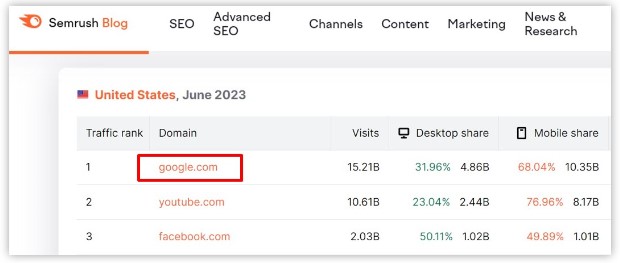
Understanding Google SEO
Search engine optimization is the practice of optimizing your website to rank higher in search engine results pages (SERPs) for relevant keywords and phrases. Google's algorithms are advanced and ever-changing, but its primary goal is to offer consumers with the most relevant and valuable material in response to their search queries. Google’s search engines consider a variety of variables when ranking web sites, including:
Choosing the right keywords
a. Thorough keyword research - Using keyword research tools to find keywords that match your content is vital. To find a balance between visibility and attainability, choose phrases with high search traffic and moderate competition.
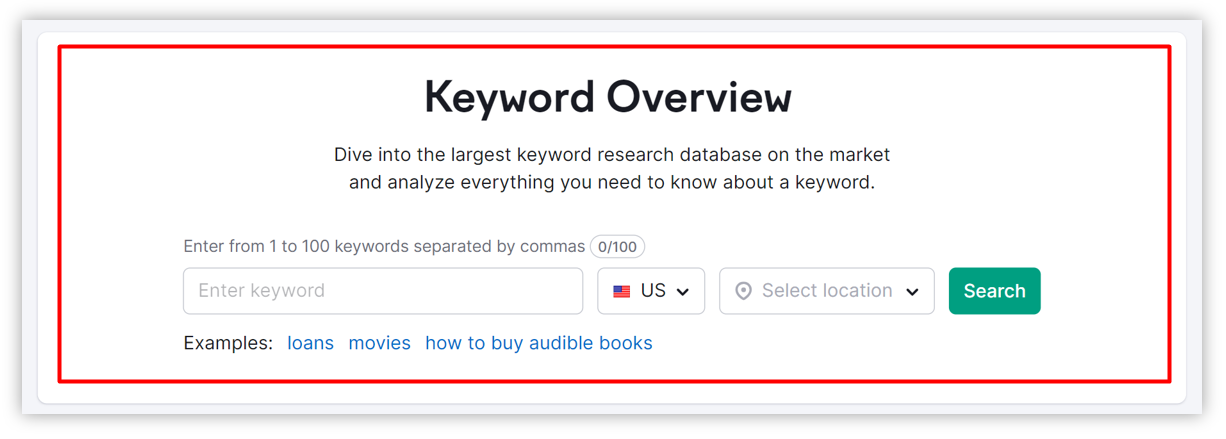
b. Strategic incorporation - Incorporate selected keywords naturally throughout your text. Maintain a focus on addressing user purpose and offering relevant information by ensuring they appear organically in titles, headers, and body content.
c. Fundamental importance - Keywords serve as a link between users’ search queries and the material you provide. Exact keyword targeting has a significant influence on how prominently your site shows in search results, eventually increasing organic traffic.
Crafting high-quality content
a. The reign of content - Creating high-quality, useful content is the foundation of SEO success. Google’s algorithms reward content that really responds to user demands and effectively engages the audience.
b. Originality matters - Duplicating content can seriously hamper your SEO efforts. Concentrate on creating material that provides unique insights, perspectives, or solutions, establishing you as an authority source in your area.
c. Regular updates - Adding new material to your website on a regular basis has a dual objective: it keeps your audience interested while also signaling to search engines that your site is current and relevant.
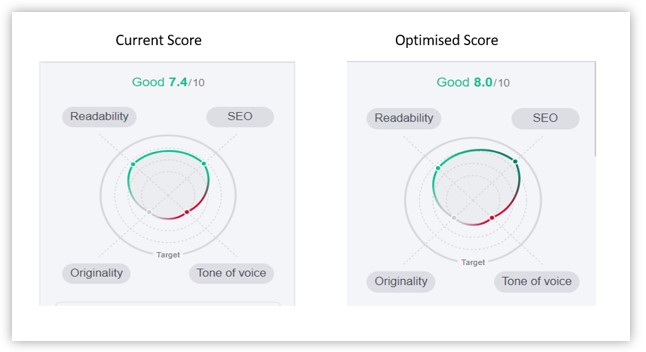
On-page optimization
a. Optimizing meta tags - The meta title and description are the initial points of contact users have with your content in search results. Create captivating meta titles that capture the essence of your content and meta descriptions that draw clicks.

b. Headers and structure - Use headers (H1, H2, H3) to create a clear hierarchical structure. This improves the readability of your content for users and assists search engines in understanding the organization of your information.
c. Reader-friendly content - Encourage user engagement by generating readily consumable material. To improve engagement, break up long paragraphs with bullet points and integrate multimedia components like images and videos.
Building quality backlinks
a. Authority building - Backlinks from authoritative and related websites act as a vote of confidence in the credibility of your material. Such endorsements boost your website's ranking.
b. Quality over quantity - Prioritize high-quality backlinks above a large number of low-quality backlinks. In the perspective of search engines, a few relevant, reputable links have more weight.
c. Diverse link profile - A diversified set of backlinks from different domains boosts your site’s credibility in the eyes of search engines. This diversified profile indicates that your material is valuable to a large number of people.
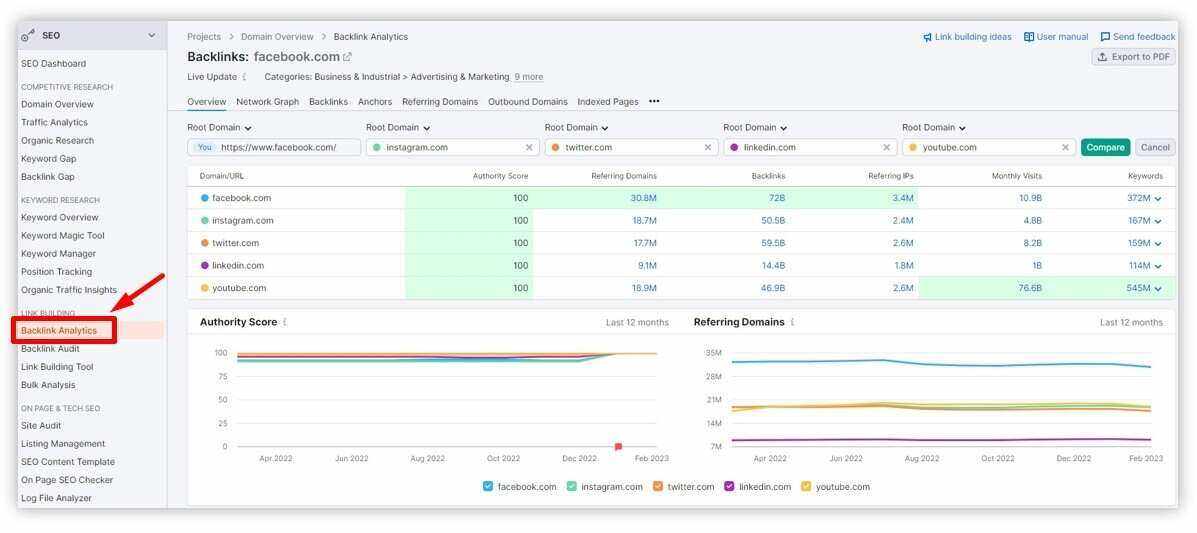
Enhancing user experience (UX)
a. Page load speed - The speed with which your website loads has a major impact on both user experience and SEO rankings. Improve content performance by compressing pictures, using browser caching, and optimizing code for quick page loading time.
b. Mobile-friendly design - In an age dominated by mobile users, a responsive design that easily changes to all screen sizes, often known as mobile-first indexing offers a great experience for all visitors.
c. User-friendly navigation - Effective navigation allows users to easily discover information, which minimizes bounce rates and improves engagement metrics.
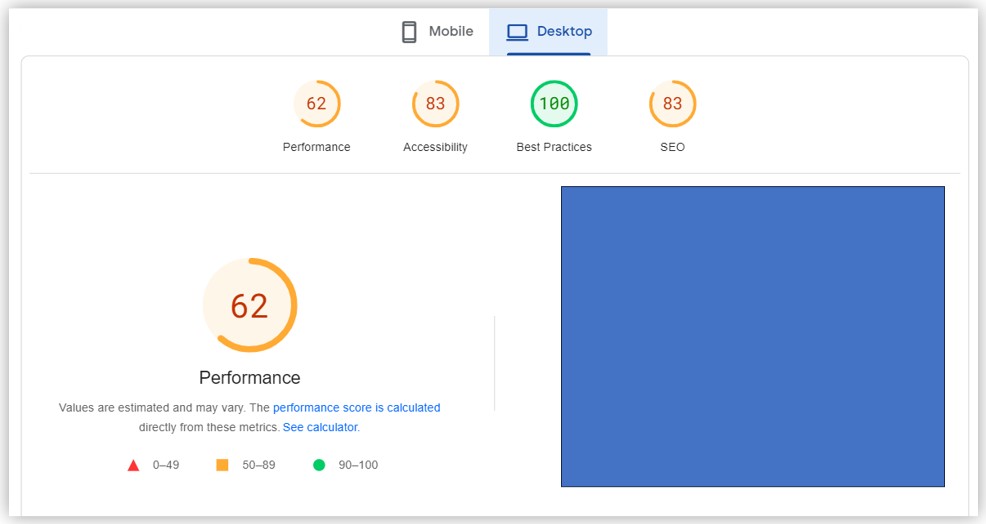
Mastering technical SEO
a. Site architecture - Organize the structure of your website rationally. A clean hierarchy simplifies navigation for users and helps search engines understand the relationships between different pages and parts.
b. Crawlability and indexability - Make sure search engine bots can simply crawl and index your information. Use a robots.txt file to specify which pages should be crawled, and develop an XML sitemap to assist search engines in comprehending the structure of your site.
c. Structured data markup - Create structured data, also known as schema markup. This code gives search engines more information about your material, allowing them to display rich snippets in search results and increase click-through rates.
Utilizing social signals
a. Indirect impact - While the direct effect of social signals on SEO results is debatable, a strong social media presence may increase the reach of your content and indirectly influence SEO.
b. Brand awareness - Active participation on social media platforms aids in the development of brand awareness. Users who become acquainted with your brand through social media are more inclined to search for it, which benefits your SEO efforts.
c. Driving traffic - Engaging content on social media sites may drive visitors to your website. Increased traffic, along with extended user interaction, communicates to search engines that your content is useful, perhaps leading to higher SEO ranks.

Monitoring and analytics
a. Google Analytics - Use Google Analytics to acquire useful insights into the success of your website, such as traffic sources, user behavior, and conversion rates. This data will help you with your optimization efforts.
b. Google Search Console - Track your site’s visibility in Google search results, correct problems, and see which keywords are bringing traffic to your site. To customize your SEO approach, use tools like Google Search Console.
c. Tracking keyword ranking - Monitor your keyword ranks over time. This allows you to assess the effectiveness of your optimisation efforts and make required changes.
Importance Of SEO
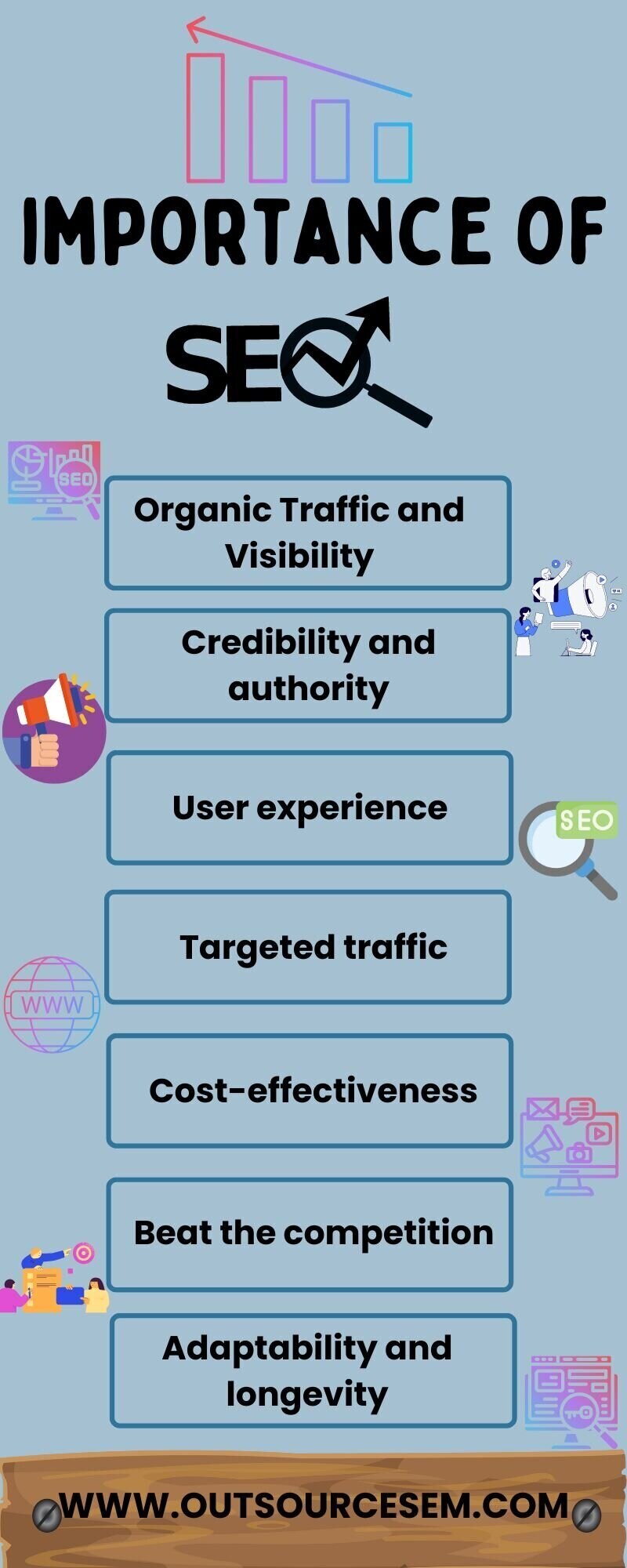
1. Organic traffic and visibility
a. Attracting organic traffic - SEO acts as an effective magnet, attracting organic, unpaid visitors to your website. Effective SEO guarantees that your content shows prominently in search results when users seek information, products, or services connected to your sector, attracting the attention of potential visitors. To increase organic traffic, you can take the help of various SEO tools like SEMrush organic research tools, etc.
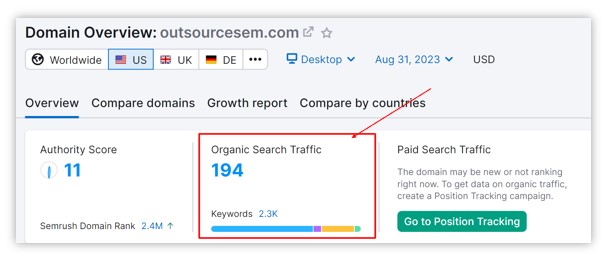
b. Trust in search engines - Google and other search engines have evolved into the go-to starting places for internet research. Users believe that these platforms will provide accurate and relevant results. By optimizing your content for search engines, you're establishing your website as a trustworthy source that search engines will confidently display to visitors. For writing great content, you can get help from a content specialist, and you can also outsource SEO, market research, offshore SEO, etc.
c. First-page advantage - The desired first page of search results is quite valuable. According to research, approximately 75% of users do not proceed beyond the first page. As a result, getting a space on this page enhances the likelihood of visitors going through to your website, boosting traffic and perhaps turning them into consumers or subscribers. In the PPC advertising world, where every click matters and you have users with high intent of clicking on the ad, the conversion rate for your paid ad campaigns increases.
2. Credibility and authority
a. Trust in high rankings - High search engine ranks imply credibility and authority. Users regard top-ranking websites as more trustworthy and credible sources of information. As your website climbs the search result rankings, it develops a sense of competence and becomes a go-to destination for people looking for information or responses. Analyzing backlinks helps to improve your site visibility.
b. Expertise and leadership - Ranking high in search results promotes you as an expert or market leader, which shows your go-to-market strategy. Users are more inclined to appreciate and value your thoughts, resulting in improved engagement and connection. This authority perception extends beyond search results and may have a favorable influence on your brand’s reputation both online and offline.
c. Impact on engagement and conversions - Credibility is more than simply a label; it is a driving force behind user engagement and conversions. Users who trust your content are more likely to spend time exploring your website, interacting with your products and services, and eventually converting into customers, subscribers, or advocates.
3. User experience
a. Search engines prioritize user experience - Search engines are focused on providing a great user experience. To measure how user-friendly a website is, they consider factors such as site speed, mobile compatibility, and relevant content. These goals are aligned with SEO practices, which improve the entire user experience.
b. Optimized site speed - SEO supports site speed optimization, which ensures that your website loads quickly. Slow-loading websites annoy users and frequently result in high bounce rates. Users are more likely to remain, investigate, and engage with your content if your site loads quickly.
c. Mobile-first design - Mobile devices account for a significant portion of online traffic. An emphasis on mobile-first design in SEO guarantees that your website is accessible and usable on a variety of devices. This responsiveness provides consumers with a smooth experience, enabling them to spend a longer time on your site.
4. Targeted traffic
a. Alignment with user intent - SEO allows you to connect your content with the goal of the user. You may guarantee that your content connects with visitors’ requirements by targeting certain keywords and phrases that they are actively searching for. This alignment improves the chances that visitors to your site are really interested in your products, services, or information.

b. Higher conversion potential - Users that find your website through focused searches are already interested in what you have to offer. This preliminary qualification increases the likelihood that they will take desired activities, such as completing a purchase, signing up for a newsletter, or contacting you for services. The targeted nature of this traffic improves conversion rates and helps your business goals.
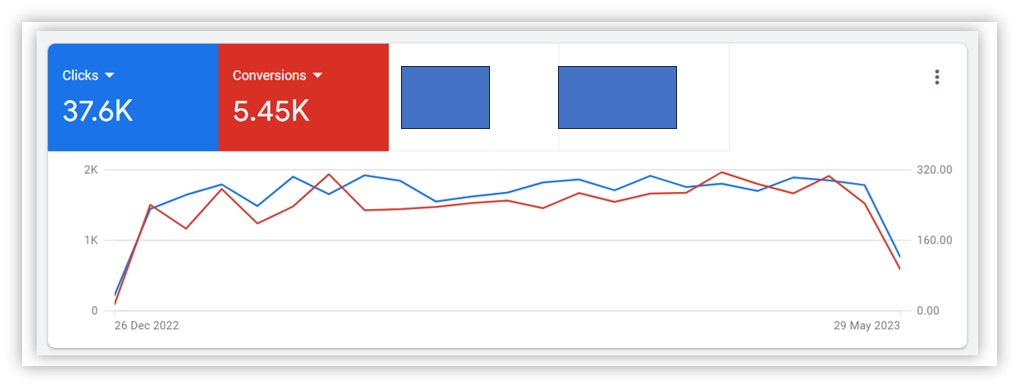
c. Relevance and engagement - SEO's focus on relevant content not only attracts but also retains consumers. Users are more inclined to read, interact with, and share information that directly meets their inquiries. Positive user interaction signals enhance search engine ranks, resulting in a virtuous cycle of visibility and engagement.
5. Cost-effectiveness
a. Long-term value - SEO provides a great return on investment that lasts over time. Unlike paid advertising, which requires ongoing expenditure to retain exposure, SEO efforts can offer returns long after the original job is completed. Once your content is well-ranked, it may draw organic visitors without incurring any recurring fees.
b. Reduction in ad costs - SEO can also be used in addition to paid advertising initiatives. When your content ranks organically for keywords that you are also targeting with paid advertisements, the cost-per-click (CPC) for those ads might be reduced. The relationship between SEO and paid advertising or PPC might help you maximize your marketing spend.
6. Beat the competition
a. Leveling the playing field - Industries of all sizes battle for attention in the huge digital world. SEO creates a level playing field for smaller businesses and startups to compete effectively against larger, more established competitors. Instead of depending simply on funding, a well-executed SEO plan helps you to earn a spot at the top of search results based on content quality and relevancy.
b. Quality over size - Search engines value quality content and user experience over business size. This implies that smaller players may have a big influence by creating excellent, well-optimized material that speaks to their target audience.
c. Niche domination - Businesses can use SEO to target specialized niches or local markets. Focusing on a specific audience allows you to position yourself as an authoritative person in your field, thereby outshining larger competitors who may lack the same level of specialization.
7. Adaptability and longevity
a. Ever-changing landscape - The digital world is always changing. Search engines are constantly refining their algorithms in order to deliver the best possible experience to its users. What worked yesterday may no longer work today. This changing climate necessitates SEO strategy that are versatile and responsive to change.
b. Core principles persist - While strategies and approaches may change, the fundamental principles of SEO stay constant. Quality content, relevant keywords, user experience, and authoritative backlinks will all remain important over time. This foundation guarantees that your SEO efforts are always based on tried-and-true methods.
Conclusion
Mastering Google SEO is a continuous journey that requires adapting to algorithm changes, staying up-to-date with industry trends, and consistently improving your website's content and technical aspects. We are creating more than simply digital assets as we negotiate the maze of keywords, optimize meta tags, and generate fascinating content. SEO turns websites into attractions, transforming search inquiries into meaningful interactions. It is also essential to work on an SEO plan & strategy to increase clicks and work on strategic marketing to convert clicks into conversions. Embracing SEO is more than simply an algorithmic exercise; it is a dedication to creating the best user experience possible, developing a brand with an everlasting reputation, and ensuring a seat on the virtual platform.
SEO is not an overnight process, but the efforts invested can lead to long-term rewards in terms of online visibility and business growth. For your PPC ad campaigns, you focus on optimizing the performance of your paid ad in sync with the marketing trends; similarly, you need to optimize the performance of SEO campaigns. As you outsource PPC services or avail of white label PPC services to ensure that the PPC experts optimize the ad performance, conduct PPC audit, prepare PPC reports, perform campaign analysis, etc., to maximize the advertising ROI. In the same way, you can get in touch with a digital marketing company and avail of white label SEO services. The SEO experts would conduct an SEO audit, prepare an SEO report, perform SEO keyword research, work on link building, conduct backlink analysis, etc., ultimately helping in achieving the desired marketing goals. Also by hiring our online marketing experts you can maximize your website traffic and visibility by availing our various services for your other businesses like HVAC SEO, lawyer SEO, small business SEO, appliance repair SEO, roofing SEO and much more. All these services can drive your business on the path of growth and enhanced conversions.
References:
. The Ultimate Guide to SEO in 2023
. Google SEO Guide: The ultimate resource
